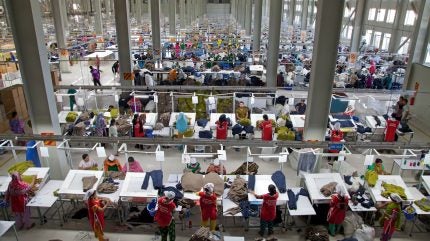
The increment comprising of 4% boost on top of the standard 5% annual increase was announced by Bangladesh Labour and Employment Adviser brigadier general (retd) M Sakhawat Hussain during a press conference.
According to Sakhawat, this wage enhancement will be effective from 1 December 2024, and will be reflected in the wages of workers from January 2025.
The wage adjustment is based on the recommendations from a tripartite committee, which includes representatives from factory owners, workers, to the government. The committee was established to deliberate on various concerns within the apparel industry.
At the negotiation table, worker delegates put forth a demand for a 10% annual wage increase, referencing the escalating cost of living. Conversely, factory owner representatives proposed an 8% rise, citing financial limitations and challenging global markets faced by the industry.
Leaders of the workers’ faction have acknowledged the decision as a noteworthy step forward but also voiced their discontent that the settled figure fell short of their initial request. They highlighted that current inflation rates are significantly impacting their standard of living.
Conversely, representatives from the garment manufacturers expressed concerns that this new wage increase would exert additional strain on them amidst existing challenges such as energy shortages, law enforcement issues, supply chain disruptions, and escalating operational expenses.
Bangladesh Apparel Workers Federation (BAWF) president Towhidur Rahman communicated to the Daily Sun that there was an expectation set by the government to align wage adjustments with inflation rates. With inflation now surpassing 11%, he emphasised that the wage hike does not correlate with inflation.
Towhidur Rahman told the publication: “Nevertheless, we have accepted the 9% wage increase. We do not want to incite disorder or protests within the industry. We want peace and progress in the sector, and I hope workers will not protest against this decision. All employers should implement it.”
Rahman also pointed out that about 70% of workers’ 18-point demands have been met and called upon the Ministry of Labour and Ministry of Home Affairs to expedite clearing cases filed against workers.
Fazlee Shamim Ehsan, executive president of the Bangladesh Knitwear Manufacturers and Exporters Association (BKMEA), said that discussions regarding the wage increase only transpired during their fifth meeting. Although they had suggested a maximum increase of 8%, a 9% rise was finalised by the government for RMG workers.
The Bangladesh Labour Force Survey 2022 indicates that approximately 60 million individuals, or 84.9% of Bangladesh’s total workforce, are informally employed. Among youths aged between 15-27 years old, an overwhelming 92.7% are engaged in informal work.
Former BGMEA Director Mohiuddin Rubel discussed with Dhaka Tribune about the challenges associated with implementing this salary increment. He explained that it would be strenuous due to limited industrial capacity; rise in production costs without a corresponding increase in revenue.
“The price of RMG items has also decreased in the global market. However, since this is a tripartite decision, there is no other way but to accept it,” Mohiuddin Rubel was quoted as saying.
The BGMEA did not return request for comment when approached by Just Style.



